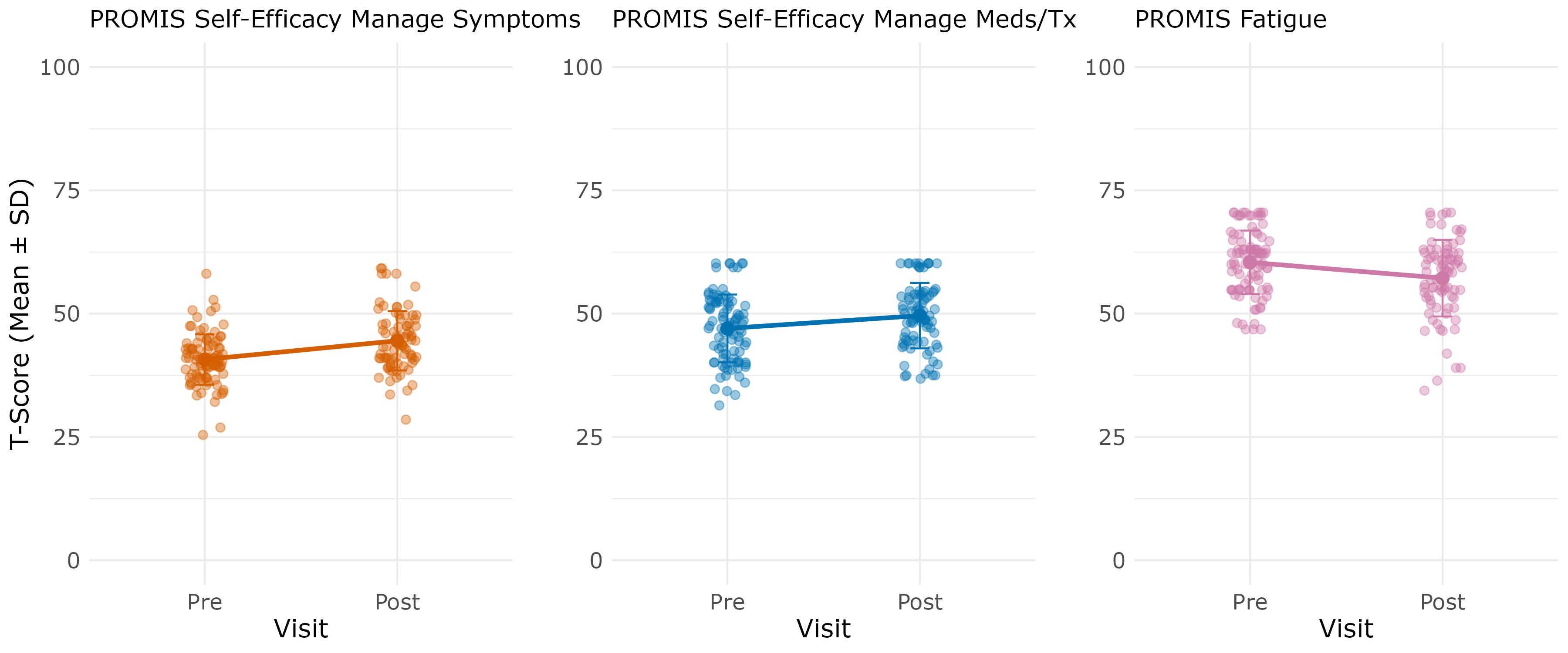Session Information
Date: Sunday, October 26, 2025
Title: (0357–0386) Patient Outcomes, Preferences, & Attitudes Poster I
Session Type: Poster Session A
Session Time: 10:30AM-12:30PM
Background/Purpose: As healthcare shifts towards patient-centered care, multifactorial lifestyle interventions, though effective, often impose time and resource burdens on patients. An online program like IMMUNE STRENGTH can streamline delivery of mindfulness, sleep, nutrition and exercise support, reduce patient burden and enhancing self-management in psoriatic arthritis (PsA).
Methods: A prospective, single-arm pilot study evaluated the feasibility and preliminary efficacy of IMMUNE STRENGTH, a 10-week online, coach-led program targeting lifestyle interventions in adults (≥18 years) with PsA per ACR criteria. To enhance external validity, participants were recruited from an academic rheumatology clinic and a national patient advocacy group. Key exclusions included concomitant systemic autoimmune diseases and inability to engage in remote coaching.The program featured weekly modules focused on four core lifestyle pillars (mindfulness, sleep hygiene, nutrition, and exercise) delivered via a platform with videos, self-guided exercises, and tracking tools such as sleep logs and dietary journals. Certified health coaches led weekly communication and provided individualized support with emails or phone calls, delivering targeted education, answering questions, and gathering feedback in real time.Engagement was measured via module completion and coaching session attendance. Patient-reported outcomes were measured using validated PROMIS scales including pain, fatigue, and global health at baseline and post-intervention (Week 10). Feasibility was evaluated based on enrollment and retention rates. Continuous and categorical variables were described using means ± standard deviations and counts (%), respectively. Changes from baseline to Week 10 were analyzed using paired t-tests. All analyses were performed in R (v4.3.1), with a two-sided α = 0.05.
Results: Of the 143 enrolled, 86 (60.1%) completed the program and were included in the Week 10 analysis. PROMIS Global Mental Health T-scores rose from 42.2 to 44.7 (SD = 5.20, p < 0.001) and Global Physical Health T-scores from 39.1 to 41.1 (SD = 4.44, p = 0.001), approaching the 3-point minimal clinically important difference (MCID) commonly cited for PROMIS measures. Perceived stress, as measured by the 10-item Perceived Stress Scale (PSS-10), declined from 7.12 to 5.70 (SD = 3.04, p < 0.001). Self-efficacy also improved: symptom-management T-scores increased by 3.45 points (SD = 4.89, p < 0.001) and medication-management scores by 3.00 points (SD = 6.55, p < 0.001). Participants also experienced reductions in symptom burden, with fatigue scores falling from 60.4 to 57.2 (SD = 6.38, p < 0.001) and pain-interference scores from 61.8 to 58.5 (SD = 5.89, p < 0.001). Finally, 90.6% of completers reported being “satisfied” or “very satisfied,” and 87.5% would recommend IMMUNE STRENGTH to others.
Conclusion: The IMMUNE STRENGTH pilot showed significant improvements in mental and physical health, self-efficacy and symptom burden, supporting the potential of an online, coach-led lifestyle intervention as an adjunctive approach for managing PsA. Further research is needed to confirm these preliminary outcomes and evaluate long-term benefits.
 Change in PROMIS Global Mental and Physical Health and PSS 10 scores from baseline to post intervention
Change in PROMIS Global Mental and Physical Health and PSS 10 scores from baseline to post intervention
.jpg) Change in PROMIS Self Efficacy and Fatigue from baseline to post intervention.
Change in PROMIS Self Efficacy and Fatigue from baseline to post intervention.
To cite this abstract in AMA style:
Zhang J, Calabrese L, Venkatachalam S, Degrassi a, Jin Y, Husni M. Lifestyle Coaching in Psoriatic Arthritis: Pilot Findings from an Online eCoaching Program [abstract]. Arthritis Rheumatol. 2025; 77 (suppl 9). https://acrabstracts.org/abstract/lifestyle-coaching-in-psoriatic-arthritis-pilot-findings-from-an-online-ecoaching-program/. Accessed .« Back to ACR Convergence 2025
ACR Meeting Abstracts - https://acrabstracts.org/abstract/lifestyle-coaching-in-psoriatic-arthritis-pilot-findings-from-an-online-ecoaching-program/
